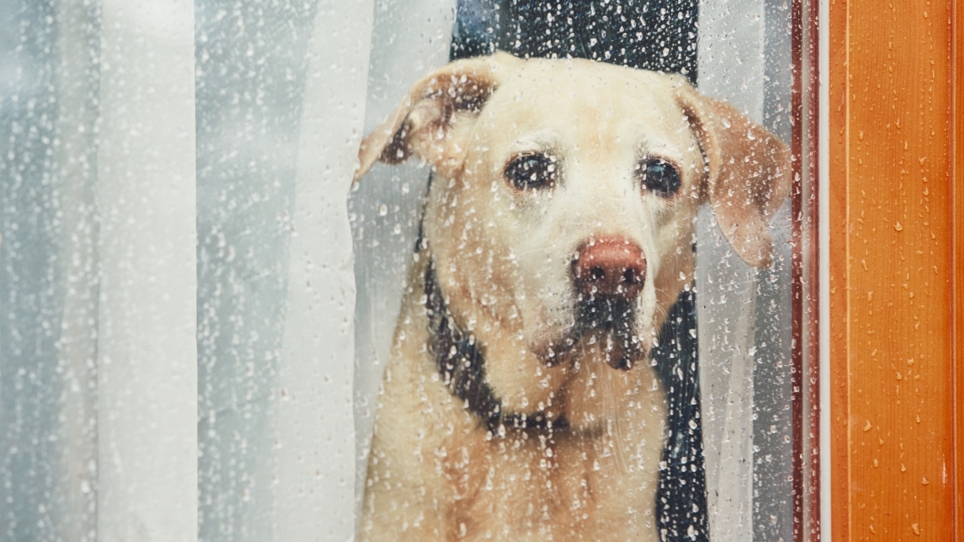How can I protect my pet?
By recognising signs that show your pet is scared of loud noises such as fireworks and thunderstorms you can be proactive and make an action plan for these occurrences.
Signs your pet is scared of fireworks or thunderstorms
• Hiding in small, enclosed spaces
• Intense barking and/or howling
• Pacing
• Drooling
• Sweaty paws
• Trembling
• Destructive behaviour at exit points
• Attempt to escape the house
• Aggression
These signs can occur before and during the event. If you see any of these signs during thunderstorms, loud noises or fireworks we recommend making an action plan.
What to include in your fireworks and thunderstorms action plan
Predict and prepare
We may not always know when a thunderstorm may occur, but if storms are forecast it pays to be prepared. On the other hand, we generally know when major fireworks displays are going to happen e.g. New Year, Chinese New Year and the Royal Adelaide Show. Here are some steps you can take to prepare your home and make it a safer environment for your pet in the event of thunderstorms and fireworks:
- Be home if possible
- Prepare a safe den for your pet to go to when they're frightened. We recommend leaving your pet inside in the laundry or bathroom with their bed and the radio on (especially if you're not going to be home). When selecting a safe space for your pet, try to pick an area of your home that's away from large windows or glassed areas to prevent your pet from potentially jumping through windows in attempt to escape. If you aren't able to designate a safe space that's away from windows, we recommend covering the windows. If you need to leave your pet outside, we recommend providing them a soundproof kennel with blankets to hide in.
- Secure all fences and gates and check they're in good condition - dogs may scale abnormal heights or break through seemingly solid objects when they're terrified.
- If no one is able to be at home, ask a friend or family member to come over and check on your pet. If fireworks are local to your area, maybe your pet can have a sleepover at someone else’s place or in a boarding facility.
Calmatives
There are products such as ADAPTIL, Storm Stress or Rescue Remedy, which you can purchase to help support your dog and reduce stress. Another product you can try is a dog anxiety vest such as ThunderShirt® which is designed to apply gentle, constant pressure to calm all types of anxiety, fear, and over-excitement issues in dogs.
In extreme cases, medication such as anti-anxiety may be useful. This can be given when a storm or fireworks is forecast so that you dog will be comfortable during the event. If you think your pet requires medication to assist them during stressful events like fireworks and thunderstorms you will need to discuss it with your vet. Do
not use human medication unless approved by your vet.
Behavioural strategies
Conditioning your pet to loud noises is a key way to reduce the fear they may experience. There are conditioning CD’s and apps available which can be used to assimilate your pet with a variety of noises.
Conditioning takes time and commitment but it's one of the best ways to help your pet cope during loud events like fireworks and thunderstorms.
Another way to help your pet cope is comforting them during a period of anxiety. You can show them that there's nothing to be
scared of by giving them a slow massage and pats, playing a game with
them or giving them a chew toy to distract them. The aim of this is to change their perception - thunderstorm = fun training, games or yummy food rather than thunderstorm = tension and
fear.
Keep identification on your pet
Microchipping is essential. All local councils, vets and major shelters have microchip scanners so that lost pets and their owners can be identified and contacted. Please remember to keep your microchip contact details up to date, this can be through Dogs and Cats Online (DACO).
Make sure your pet has an ID disc with their name and your current telephone
number on it so if your pet escapes and someone finds them they can give you a call. If someone else is looking after your pet while you're away, it's a good idea to get a new disc with
their phone number on it.
Act fast if your pet is lost
If you've lost your pet, report them missing straight away – don't delay! Leave a description of your pet and their photo with your local councils and vets, major shelters like AWL and RSPCA, as well as Lost Pets of South Australia on Facebook.
You can also lodge a lost pet report with Animal Welfare League by clicking the button below.
Head to our blog for more information about what to do when you lose your dog and what to do when you lose your cat.
